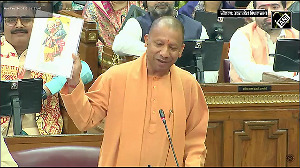The sweltering summer heat is usually the reason for various health complaints. The negative effect the sun has on hair, however, is often ignored. Your hair is often exposed to the sun's harmful rays for long hours, and the modern urban lifestyle can take its toll. Summer is a particularly sensitive time for hair, so here are a few summer hair problems along with tips to avoid them from India's first certified trichologist, Dr Sonal Shah.
Exposure to sunlight: The sun cannot really burn hair, but it can damage your hair's natural protective film. According to a recent study, after just three days of sun exposure, the scale-like cells covering each hair shaft begin to peel off, making hair dry, dull, brittle and fragile.
Humidity: High levels of humidity tend to damage hair, causing the strands to stretch, making them brittle. To keep the hair healthy and free of the effects of humidity, wash your hair regularly in summer -- either daily or once in two days.
Split ends: Traveling by train or car with the wind rushing through your hair might feel great, but it isn't the best thing for your mane. The breeze will leave you with dry, tangled hair, which ultimately leads to the splitting of hair ends. Another culprit that can cause split ends is mineral deficiency. Drink enough water in summer to flush out toxins, and maintain a protein-rich diet to combat the problem.
Water sports: Both chlorine in pools and salt in seawater, tend to dry and discolour hair. Chemicals in pool water tend to bind with the hairstrands, giving them a grayish or greenish cast, while mineral deposits in salt water, combined with exposure to sunlight, dehydrate hair and make the strands brittle. Prior to a swim, it is recommended that you thoroughly wet your hair with tapwater and add a bit of conditioner. Wash your hair with a scalp-cleansing shampoo immediately after exiting the pool.
Loose anagen syndrome: A diet-related factor, this can be identified when hair falls with a white tip. The presence of the root indicates that while your hair growth cycle is normal, your hair root is not strong enough to sustain the pressure of a fully-grown hairstrand. The solution is a change in diet, in consultation with your trichologist.
Chemical treatment: Hair that has been dyed or highlighted is particularly prone to UV damage. Coloured hair is already damaged, and exposure to the sun tends to make the cuticles even rougher. Most of the chemicals used to colour hair contain some form of peroxide or metal and can cause severe damage to your hair. It is recommended that you cover your hair with a scarf while you are exposed to the sun to prevent these problems.
Apart from these, one of the most common causes of shabby-looking locks in summer is poor maintenance -- improper brushing and washing, and infrequent trimming. Here are a few simple techniques that can leave you with healthy, beautiful hair:
Oiling: Oil your scalp every alternate day to stimulate blood flow and relieve stress. Sluggish blood flow and stress can both cause hair loss. Use jaborandi hair oil for a head massage once a week -- leave it on overnight, and rinse out the next day.
Shampooing: Although cleaning hair is necessary, overdoing it can be harmful. The natural oil -- sebum -- that coats each hair and keeps it looking shiny and soft, can be washed off if your shampoo does not remove just the right amount of it. Use a scalp-cleansing shampoo that is designed to remove toxins (for instance, chlorine) from your hair, as well as auto-emissions and other environmental pollutants.Daily shampooing is not a problem as long as the shampoo is formulated for daily use. Instead of using a blow dryer, gently squeeze excess water from your hair and blot it with a towel.
Combing: Separate hair into small sections. Use only a wooden or tortoise shell wide-tooth comb, never rubber or iron, and carefully work from the ends in a downward direction only. Make sure the ends of the comb are not pointed. Never yank your hair.
Brushing: Bend forward, and using only a wooden-base natural bristle brush, bring hair from the nape of the neck over the head and down to the ends. Then, stand straight again and brush from the underside of the hairline down the strands to the ends. Now, brush the top layers into place with long, even strokes. After each stroke, smooth hair with hands to reduce static. Increase the number of strokes every week, starting with five. Increase the strokes by one every week until you find a comfortable routine. If oiliness develops, reduce strokes.
Remember to brush your hair only when it is dry, and always comb before brushing. Hair is weakest when it is wet, and brushing can easily cause damage as a result.
Trimming: Make sure you get your hair trimmed on a regular basis, every six to eight weeks. This is particularly important for growing out layers.
Styling: It is important to style your hair right but, all too often, styling products contain alcohol or other harsh chemicals which are best avoided. Also, avoid excessive dry heat, such as that from beauty aids like blow dryers and curling irons.
Protection during outdoor activities: Before going out to the beach or pool, comb some leave-in hair conditioner through your hair, preferably one that contains sunscreen. The sun's heat will activate the conditioner, softening your hair, while the sunscreen will prevent UV rays from causing damage to the strands.
If your hair is colour-treated, be especially sure to use a leave-in conditioner with sunscreen to prevent the colour from fading.
Sleeping: Even the way you sleep can affect your hair. Restless sleepers may actually be breaking hair as they sleep. If you are a restless sleeper, substitute a satin pillowcase for a cotton one so that the hair glides when you move in your sleep. Alternatively, hair may be comfortably tied in a ponytail on top of the head to avoid damage. Always use cloth-covered bands or scrunchies for this purpose.
Diet: Maintain a balanced diet to ensure your hair and body get all the essential nutrients it needs. Hair is a reflection of your wellbeing. If you are unhealthy, your hair will follow suit. Treat your body with care, follow a proper hair care regimen, and supplement your diet with balancing vitamins. Treat your hair with attention and care and you'll have hair that will look good and feel great all your life.






 © 2025
© 2025